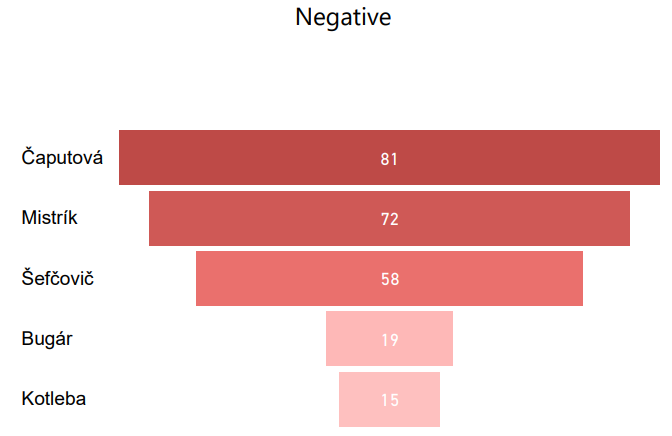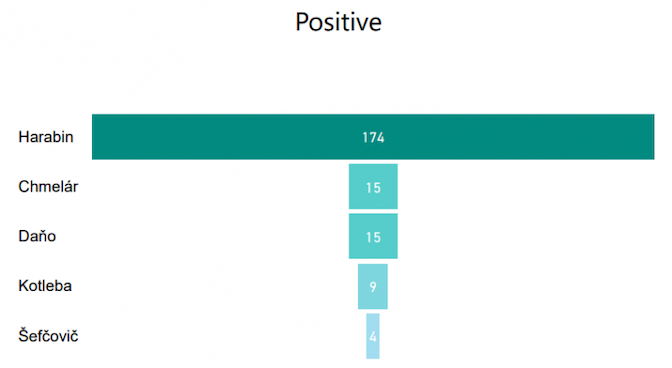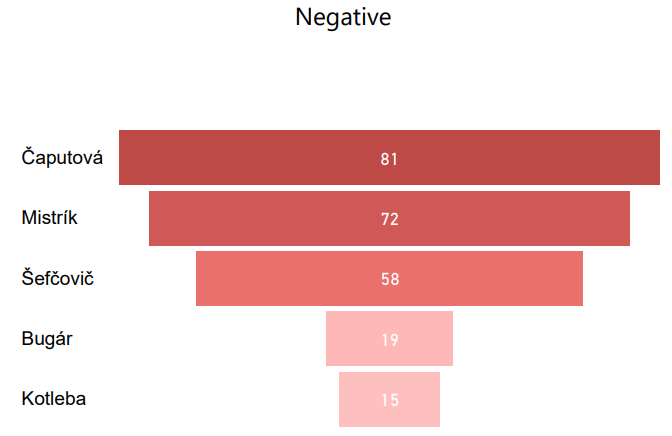Slovak Presidential Election Followed Through Facebook Disinformation Channels

The most popular disinformation pages on Facebook
Based on data from ZoomSphere and blbec.online we identified 14 most relevant pro-Kremlin disinformation channels in Slovakia on Facebook following these criteria: the number of fans, the number of people talking about the page (see below) and provision of information on the presidential campaign. Facebook pages were monitored, excluding those officially or unofficially linked to specific candidates. 649 posts relevant to the Slovak presidential election were analysed within the time frame of January 10 – March 3, 2019.

The most influential Facebook disinformation outlets by page storytellers (the number of people talking about the page), source: ZoomSphere
Candidates


Of the analysed 649 posts which were identified as having either positive, negative or neutral sentiment, 208[1] had a positive connotation. 84% of all the posts with positive sentiment were associated with Štefan Harabin, which confirms the general perception that Štefan Harabin is the candidate enjoying wide support and promotion through analysed disinformation channels. On the contrary, Zuzana Čaputová has been most often the target of intense disinformation campaigns and has been depicted in negative terms, particularly ever since Robert Mistrík chose to leave the competition for the office of the President in Čaputová’s favour. Up until then, she has been mostly portrayed in neutral terms while he has been subjected to negative portrayal.
Another interesting fact is that Marián Kotleba is also increasingly being portrayed in negative terms and seen as splitting the anti-liberal democratic votes and thus as damaging the “national interest”. The collected data shows, that analysed disinformation outlets have their favourite candidate and that is not Marián Kotleba.
Recurrent Narratives on Disinformation pages
The most prevalent narrative pushed by the analysed disinformation Facebook pages concerning the upcoming presidential election can be summed up as ‘mainstream media cannot be trusted’. This notion has been pushed more intensely since 25th of February and most often by Zdrojj, Slobodný vysielač, Zem a Vek and Hlavné správy, coinciding with the time when opinion polls started suggesting growing preferences of liberal presidential candidates.

In line with other recurrent narratives of election interference and hidden powers conspiring for influence, this effectively primes their audiences to distrust not only the electoral result, should the election be won by candidate other than Harabin, but overall this strategy consciously pushes forward these narratives to undermine key building blocks of liberal democracies. Other prevalent narratives are liberalism as a cause of chaos to stable societies and ‘traditional’ values with nationalism as the only antidotes to that.

The occurrence of ‘Election interference’, ‘Mainstream media cannot be trusted’ and ‘Conspiracy & hidden interests’ narratives, source: ZoomSphere
Methodology
The data has been collected between 10.1.2019 and 3.3.2019 from 14 relevant Facebook pages, identified by blbec.online as producing disinformation content and pro-Kremlin narratives: Hlavné Správy, Hrica Ľuboš, InfoVojna, Konzervatívny výber, Ľuboš Blaha, Národ Slovenský, Otec Marián “Maroš” Kuffa, Ruské spravodajstvo, Sila Pravdy, Slobodný vysielač, Sloveni, Spravodajská alternatíva, Zdrojj and Zem a Vek. The data has been filtered through the term ‘President’ and then labelled based on the sentiment toward a presidential candidate and the most prevalent narratives identified. This report will be followed by more in-depth study in April, which will cover the whole period of electoral campaign and its result as well as a network map of the analysed disinformation Facebook pages.
This report was also published as a part of a joint report of 4 organizations - GLOBSEC, MEMO 98, SSPI and STRATPOL in Slovak language.
This report was published in the framework of project run by the GLOBSEC Policy Institute and supported by the National Endowment for Democracy. 
[1] This number does not match the sum of positive connotations per candidate because some posts had more than one sentiment
